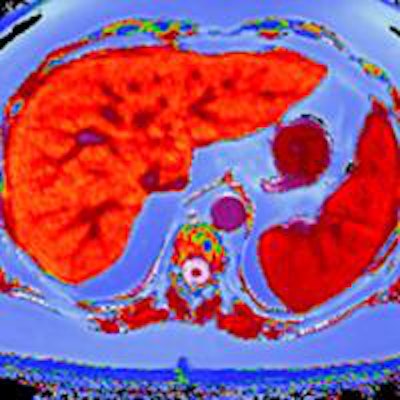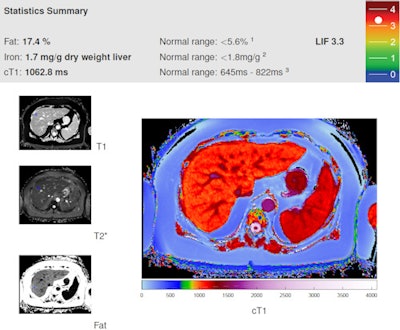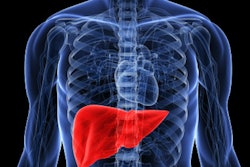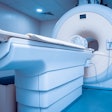
Perspectum Diagnostics, a start-up company spun off from Oxford University in the U.K., is preparing to unveil a new software application designed to cut down on unnecessary invasive liver biopsies. The firm's LiverMultiScan software uses quantitative MRI parameters to determine which patients should be sent on for additional workup.
Chronic liver diseases affect some 450 million people worldwide, and the condition is becoming more common with rising levels of obesity. Under the current standard of care, patients suspected of having liver disease undergo needle biopsy for a definitive diagnosis.
At the same time, various MRI protocols can be used for liver imaging. But clinicians have to use different techniques to assess different functions, such as T2* mapping for iron scoring, or MR spectroscopy for quantifying fat content.
But Perspectum believes there's another way. Using research first conducted at Oxford by chief executive and founder Dr. Rajarshi Banerjee, the company is pursuing a technique that combines multiple quantitative parameters from MRI scans into a single score to predict which patients actually have disease, according to Keri Hildick, business development officer at the U.K. firm.
LiverMultiScan analyzes three key measures from MRI scans: steatosis, iron content, and T1 maps. Data from T1 maps can be problematic due to differing T1 protocols from different MRI vendors, so Perspectum developed a proprietary algorithm that corrects for differences to produce a standardized measure called a liver inflammation and fibrosis (LIF) score.
 Report produced by LiverMultiScan software indicating patient with LIF score of 3.3, indicating probable liver disease.
Report produced by LiverMultiScan software indicating patient with LIF score of 3.3, indicating probable liver disease.Several research studies have been published validating the LIF scores for predicting liver disease. In a February 2016 paper by Pavlides, Banerjee, et al, in Journal of Hepatology, low LIF scores were found to have 100% negative predictive value in predicting that low-risk patients would be free of negative clinical outcomes, while patients with higher LIF scores were found to be at greater risk of liver-related events, such as death, cancer, and liver failure.
For its liver application, Perspectum is targeting its message to two groups of doctors, the first being the hepatologists and gastrointestinal physicians who would refer patients for liver MRI scans, and the second being the radiologists who would perform and read the scans.
"We are trying to raise awareness among those who will order this test, and then engage more proactively with radiologists who will perform it," Hildick said.
Perspectum launched LiverMultiScan as a research tool in 2014, and in 2015, the software received U.S. Food and Drug Administration (FDA) 510(k) clearance for a version designed for clinical use. The company made a soft launch of the software late last year, talking to key physicians at the 2015 meetings of the RSNA and the American Association for the Study of Liver Disease.
At present, the clinical version of the software runs on the Skyra 3-tesla MRI scanner from Siemens Healthcare, using data generated from the scanner's MyoMaps cardiac T1-gating protocol and applying it to the liver. Perspectum is developing a clinical version for scanners from other vendors, and expects FDA clearance for these versions by the end of the year (the research version of LiverMultiScan already runs on multiple scanners).
Perspectum is planning for an official U.S. product launch of LiverMultiScan in the fourth quarter of this year. The firm's initial business model calls for the software to be offered as a subscription service. Customers can send their MRI data to centers the firm is setting up in London and Boston; results will be returned in two business days. For Asian sites, the firm is planning to set up a center in Singapore.
As it moves to market, Perspectum is receiving assistance from U.K. imaging software developer Mirada Medical. Indeed, the firms share a common founder: Sir Michael Brady, a professor in oncological imaging at Oxford, who is severing as Perspectum's chairman.



.fFmgij6Hin.png?auto=compress%2Cformat&fit=crop&h=100&q=70&w=100)




.fFmgij6Hin.png?auto=compress%2Cformat&fit=crop&h=167&q=70&w=250)











